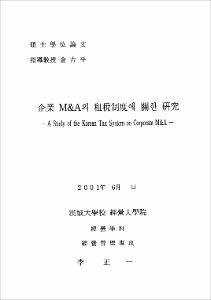企業 M&A의 租稅制度에 관한 硏究
- Files in This Item:
-
-
Download
 000000065990.pdf
기타 데이터 / 3.46 MB / Adobe PDF
000000065990.pdf
기타 데이터 / 3.46 MB / Adobe PDF
-
Items in Repository are protected by copyright, with all rights reserved, unless otherwise indicated.
 000000065990.pdf
기타 데이터 / 3.46 MB / Adobe PDF
000000065990.pdf
기타 데이터 / 3.46 MB / Adobe PDFItems in Repository are protected by copyright, with all rights reserved, unless otherwise indicated.